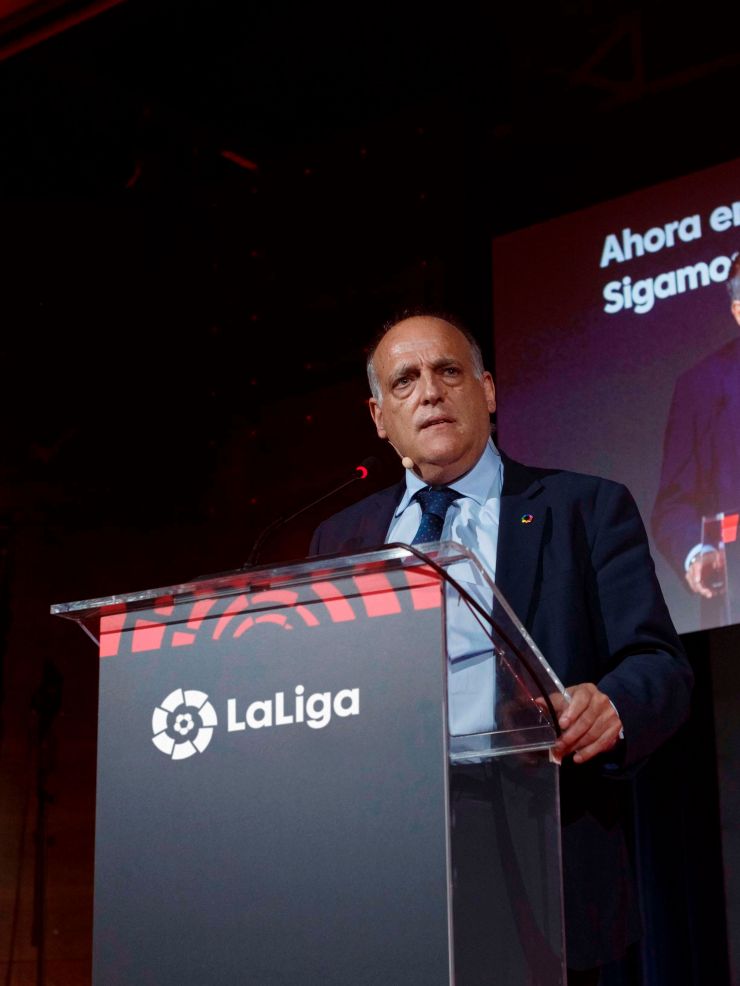Pressroom
What is LALIGA?
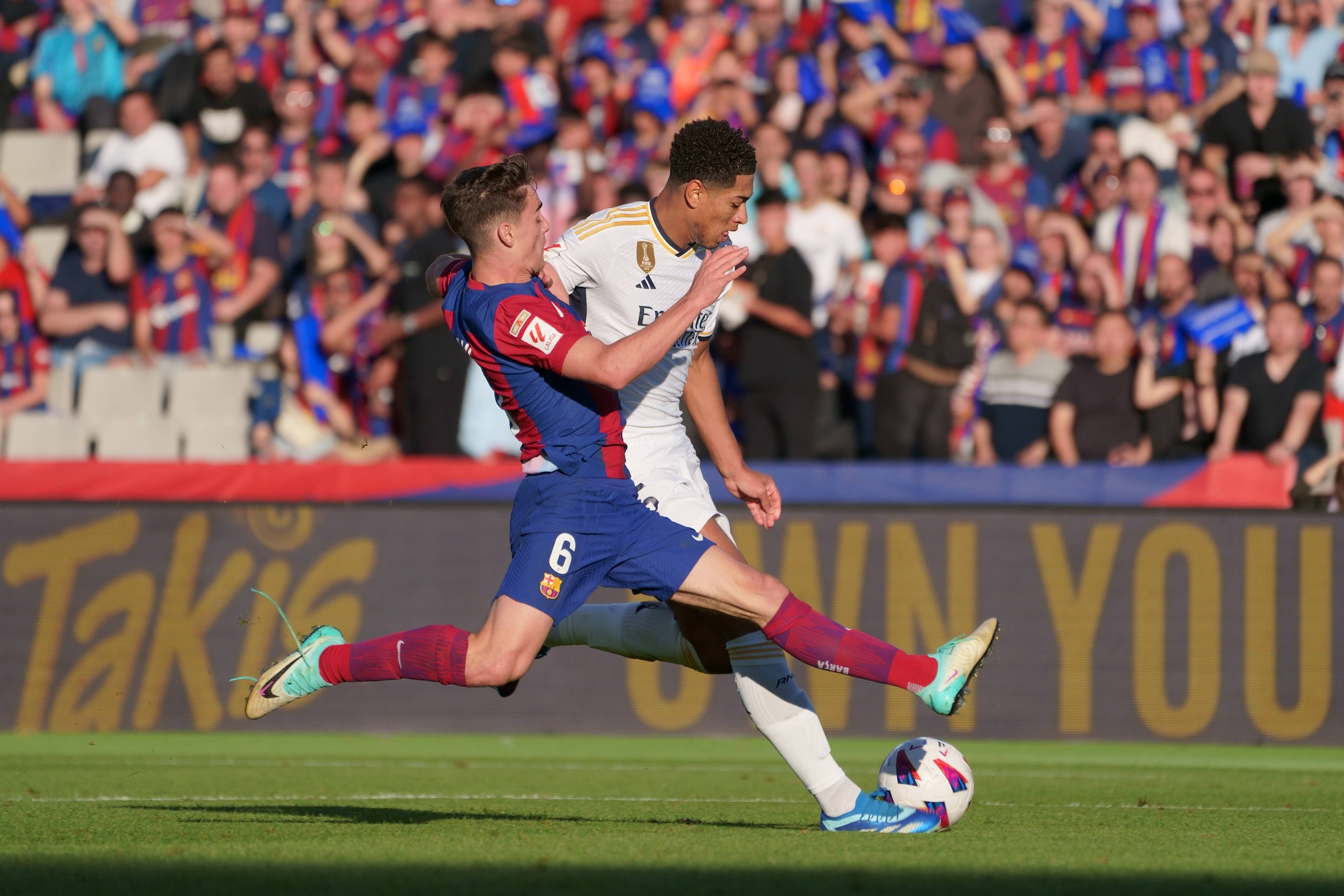
What is LALIGA?
LALIGA is a global, innovative and socially responsible organisation, a leader in the leisure and entertainment sector. It is a private sports association composed of the 20 clubs and SADs (public limited sports companies) in LALIGA EA SPORTS and the 22 in LALIGA HYPERMOTION, responsible for the organisation of these national professional football competitions.
With headquarters in Madrid (Spain), it is present in 41 countries through its 13 offices and 44 delegates.
In the 2019/2020 season, LALIGA reached more than 2.8 billion people globally.
The association carries out its social action through its Foundation and is the world's first pro essional football league with a league for intellectually challenged footballers: LALIGA Genuine.
LALIGA today
Since 2013 and Javier Tebas's appointment as president, LALIGA has embarked on a journey of growth and constant evolution based on financial controls, the centralised sale of audiovisual rights and a strategy of internationalisation and technological leadership. All of this has made the institution a role model within the sector and one of the best professional leagues within the world of sport, which is serving to attract the interest of new generations.
Financial controls
In 2013, the debts held by the LALIGA clubs and SADs with the Spanish tax authorities (Hacienda) stood at €650 million and, two years prior to this, the number of complaints brought by players over non-payment of wages amounted to 341 and involved a total of €84m.
The impact that the financial controls have had on the LALIGA clubs and SADs can be summarised as follows:
- There are currently no outstanding player wage, tax or Social Security payments.
- 2. The debt with the Spanish tax authorities has been reduced by €629m as of December 2020.
- A genuine competition has been created and financial doping has been prevented.
All of this makes LALIGA more solvent, attractive and stronger, with this growth reflected in player salaries, which serves to improve the competitive level across the competition.
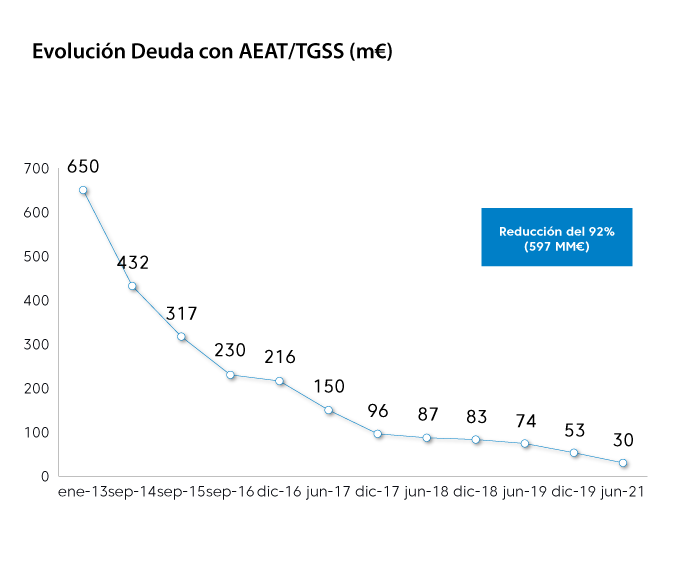
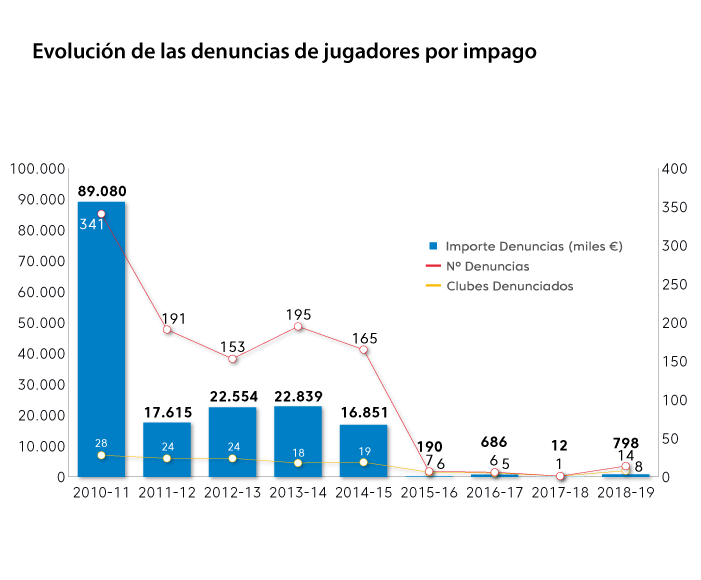
Boost LALIGA
In 2021, LALIGA’s Assembly approved the strategic agreement with investment fund CVC Capital Partners, in order to boost the global growth of LALIGA and its clubs. This is an ambitious investment plan that will provide LALIGA and its clubs resources that can continue the process of transformation, making this a global organisation of digital entertainment, strengthening the competition and enhancing the experience of fans. With this partnership, in which CVC valued LALIGA at €24,250 million, LALIGA will retain its sports responsibilities as well as the organisation and management of the marketing of the audiovisual rights. The participating clubs should use the funds in the following way: 70% for infrastructure, 15% for the restructuring of financial debt and 15% for the registration of players.
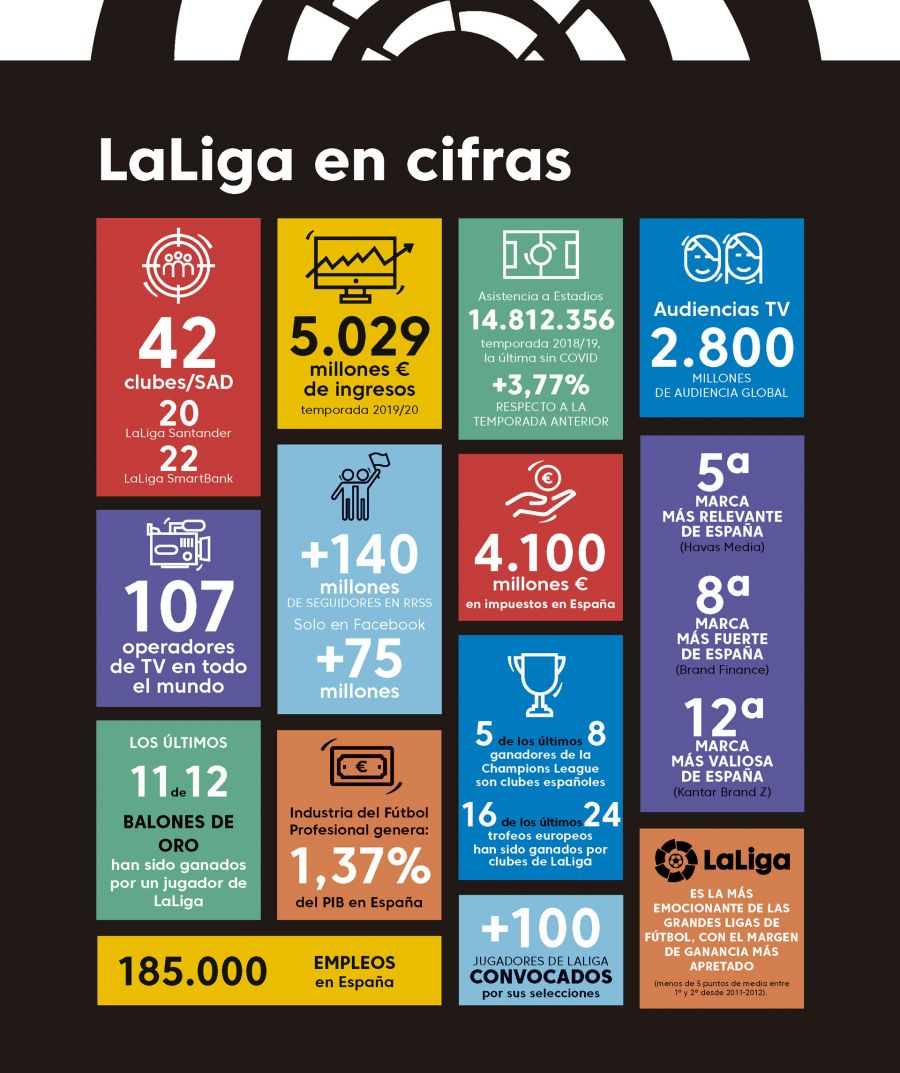
Audiovisual rights
LALIGA is responsible for the joint marketing of the audiovisual rights on behalf of the LALIGA EA SPORTS and LALIGA HYPERMOTION clubs and SADs.
The audiovisual rights, which are valued at close to €2 billion per season in the current audiovisual cycle, represent the clubs' main source of revenue, exceeding 60% of revenue for the majority of clubs.
The Royal Decree-Law 5/2015 establishes the criteria for the distribution of broadcasting revenue obtained from the joint exploitation and marketing of the audiovisual rights.
International growth
Foreign interest in the Spanish game has grown exponentially in recent years. LALIGA works on a daily basis to promote Spanish football beyond the country's borders, with the objective of creating a community of fans throughout the world.
LALIGA's global expansion is underpinned by the following three cornerstones: its international offices, the network of LALIGA Global Network delegates and the joint ventures it is working on in different areas of the world.
LALIGA's international offices are located in:
Belgium (Brussels)
India (New Delhi)
China (Shanghai)
Nigeria (Lagos)
China (Beijing)
Mexico (Mexico City)
South Africa (Johannesburg)
Singapore (Singapore)
United States (New York)
UK (London)
United Arab Emirates (Dubai)
Meanwhile, the LALIGA Global Network delegates are based in destinations across the five continents.
LALIGA is actively engaged in three strategic joint-venture partnerships:
- LALIGA North America, in association with RELEVENT
- LALIGA Mexico, also in association with RELEVENT as an extension of the above
- LALIGA China, in association with Mediapro and Super Sports
LALIGA's internationalisation efforts saw the institution named the Honorary Ambassador of Brand Spain in the international relations category in 2019, "on account of its contribution to offering a positive image of Spain across the world through football" and "assisting the internationalisation of both Spanish companies and athletes."

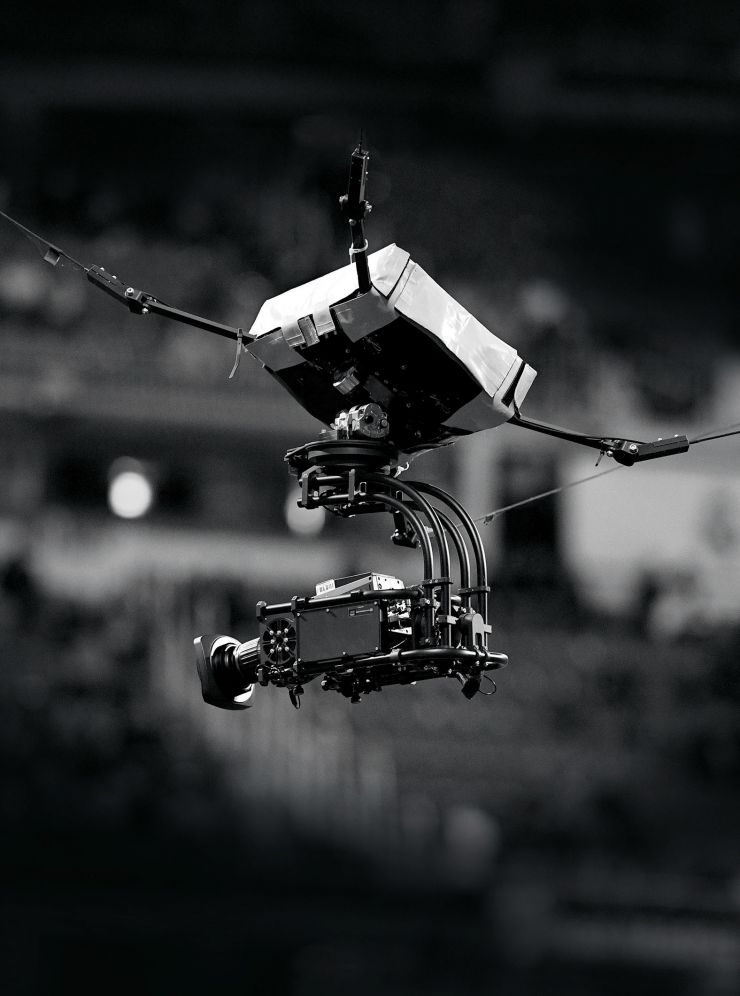
Innovation & technology
Innovation and technology currently represent one of the cornerstones of LALIGA's medium- and long-term growth.
The clubs' association boasts a digital ecosystem that combines channels, services and data. The combination of these elements provides LALIGA with a complete overview, which the organisation uses to improve its audiovisual product for the benefit of supporters, sponsors, broadcasters and, of course, the clubs.
LALIGA Tech
LALIGA Tech is a subsidiary that brings together the technological solutions developed by LALIGA and that makes them available commercially to third parties, thereby generating a new line of business for the clubs/SADs.
These digital tools have been worked on since 2013 by LALIGA, as the organisation looked for solutions to its particular needs. Now, through LALIGA Tech, these services are supplied to the entire sports and entertainment industry, with clients including World Padel Tour, Dorna Sports, Jupiler Pro League and Sky Mexico.
One of the keys behind this project is the Business Intelligence & Analytics department, that has become the main axis of innovation at LALIGA thanks to a transformation process that made the organisation one built around data. The objective is to centralise, organise, prepare and provide all the necessary information in order for decisions to be made based on data and carried out efficiently.
The following are examples of these technological tools, which help with decision-making and with daily tasks:
- LALIGA+:This is an over-the-top (OTT) media platform which enables LALIGA to remain at the forefront of technology within the audiovisual sector and innovate to allow fans to enjoy all sporting disciplines. The platform offers free coverage of live and pre-recorded content, reports and interviews relating to the main competitions run by Spanish federations and leagues. This allows LALIGA to offer greater visibility and exposure of other sporting disciplines that are not covered by the traditional channels and whose content is disseminated in a very limited way amongst fans.
- Anti-piracy:In a show of responsibility, LALIGA safeguards its product through the efforts of its technological protection of content department, which employs around 20 experts. This department uses internally developed tools that help to combat piracy, such as Marauder, Lumière, Black Hole and Neko. LALIGA shares its know-how in this field with other organisations, including Dorna Sports, Belgium's Jupiler Pro League and the Spanish government's Ministry of Culture.
- Mediacoach:This suite of advanced tools provides the 42 LALIGA EA SPORTS and LALIGA HYPERMOTION clubs with analysis and statistics to help them improve their performance levels in the competition. An advanced system of tracking cameras records and monitors player and ball movement, which allows for a more in-depth study of the play and the technical-tactical and fitness aspects involved in a game.
- Calendar Selector:This LALIGA-developed tool uses machine learning and algorithms to suggest the kick-off times that will optimise TV audience and stadium attendance figures. The application, which is stored in the cloud, employs historical audience and attendance data plus a further 70 variables.
- Sunlight Broadcasting Planning:This application forecasts the natural light conditions for each game. It indicates which areas of the stadium will be in the sunlight and the shade, which offers a preview of how the sun will impact on the TV image and on supporters, players, etc. and therefore helps when it comes to scheduling kick-off times. Within this application, LaLiga uses a 3D reconstruction of the stadiums.
- Players App:This is a mobile app that provides players with privileged information relating to the pre-match and post-match, as well as exclusive lifestyle content (fashion, health, gastronomy…). The app also gives players the ability to consult performance information from a match or the season as a whole, both individually and collectively. Furthermore, thanks to facial recognition software, players are sent photos of themselves at the end of matches for use on social media.
Audiovisual quality
-
4K – HDR PRODUCTION
LALIGA uses over 30 cameras for the biggest matches of each season. -
AERIAL CAMERA
A bird’s eye camera located at a height of 21 metres. -
360º REPLAYS
This technology uses 38 ultra-high definition cameras situated throughout the stadium to create volumetric videos in 360º to offer stunning action replays. -
LIVE 3D GRAPHICS
LALIGA is the only domestic competition in the world that uses the innovative technology offered by Live 3D Graphics to generate virtual graphics during broadcasts. -
MULTI-SCREEN
This is a new multi-camera signal for broadcasts, with four streams displayed on one screen as well as real-time statistics taken from the data analytics system Mediacoach. The objective is to offer the viewer an alternative broadcast in order to enjoy different perspectives and data from the match. -
ACROBATIC DRONES
An “acrobatic” drone, given its ability to film every corner of any stadium, has collected footage from all LALIGA EA SPORTS grounds, from the tunnels to the roofs. This has produced some spectacular images that will enhance broadcasts and programmes, offering a unique and immersive experience to all fans of Spanish football.
Integrity & security
Battle against match-fixing
One of LALIGA's priorities is the fight against sporting corruption and the promotion of good practice within football. The institution works on the following aspects in this field:
Talks are delivered to all players and professionals at the LALIGA clubs, including the reserve teams, about integrity and the legal and administrative consequences of any possible involvement in match-fixing.
Football matches across Spanish football are monitored on a 24/7 basis. LALIGA has developed Tyche 3.0, software that monitors and analyses global betting activity relating to Spanish football, for this purpose. The program uses machine learning algorithms to enable possible cases of match-fixing to be identified more quickly and in a more objective and effective manner.
LALIGA is a member of the National Commission against the manipulation of sporting competitions and betting-related fraud, a body where it is joined by the following organisations: the General Directorate for the Regulation of Gaming, the National Police, the Civil Guard, the Spanish Football Federation (RFEF) and online gaming operators.
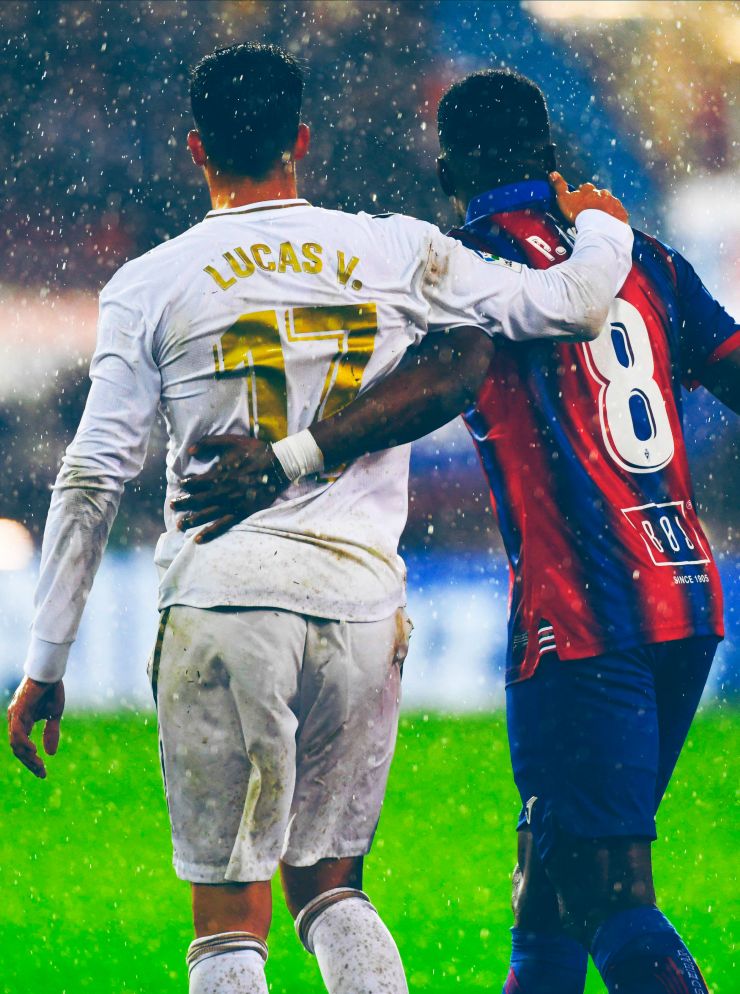
Battle against violence
Another of LALIGA's main objectives concerns the battle against violence in and around football stadiums.
To achieve this objective, LALIGA coordinates and collaborates with those responsible for security within the clubs and is a member of the National Commission against violence, racism, xenophobia and intolerance in sport and works very closely with the National Sports Office and the State Law Enforcement Agencies.
LALIGA submits a weekly report to the RFEF's Competition Committee and the Anti-violence Committee with information regarding chants heard during matches that incite violence or feature content that is insulting or displays an attitude of intolerance.
Corporate Social Responsibility
LALIGA is aware of the impact and influence that football has within society and, as such, pursues a strategic aim that sees the organisation lead ethical, social and environmental initiatives under the umbrella of Corporate Social Responsibility (CSR).
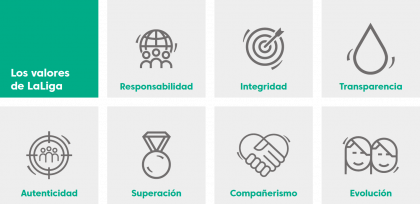
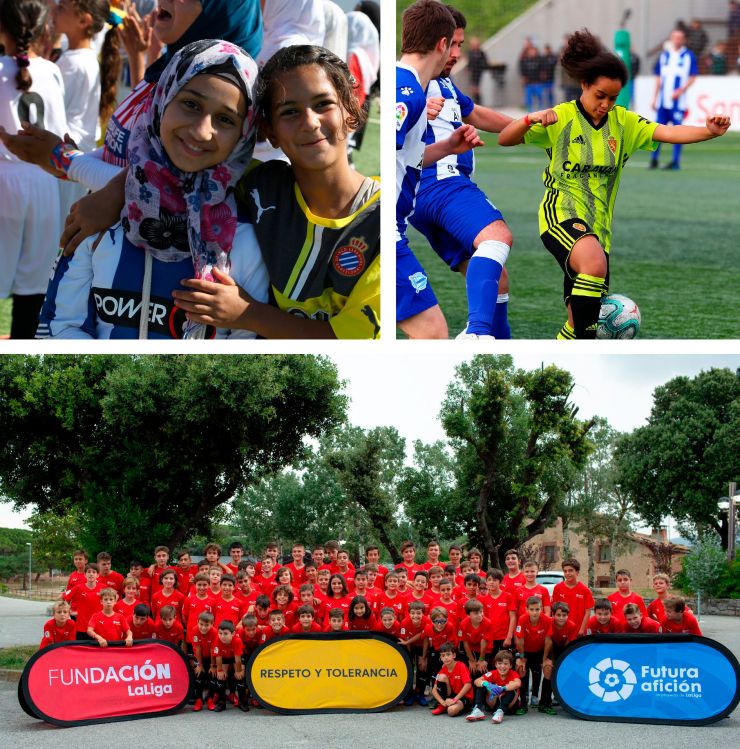
LALIGA FOUNDATION
LALIGA carries out its social outreach work through its Foundation, which was founded in 1993 and is a pioneer in the world of professional football. The LALIGA FOUNDATION's projects pursue the objective of transforming society through positive footballing values, such as integrity, hard work, self-improvement, collaboration and teamwork.
The LALIGA FOUNDATION's activities can be divided up into the following three main categories:
- Institutional activities
- Cultural and educational activities
- Social activities
Amongst the various projects led by the LALIGA FOUNDATION, the following are of particular note:
- LALIGA Genuine: A social responsibility and integration initiative that is a pioneer on a global level and features a football league composed of teams of people with intellectual disabilities (ID). Now in its third season, the competition features the participation of 36 professional football clubs and aims to normalise the practice of football within the ID community, promote a commitment across the professional game to this socially responsible project and make LALIGA an agent for social change.
- Fans of the Future: An educational project which displays a firm commitment to equipping children with the tools to become respectful fans of the future and allow them to identify anti-sporting attitudes, both on and off the field of play.
- LALIGA Za’atari Social Project: The LALIGA FOUNDATION runs this project alongside LaLiga's sporting projects department, the Global Network delegation in the United Arab Emirates and local NGO AFDP Global at the Za'atari refugee camp in Jordan, where the institution promotes and leads a socio-educational outreach programme through football aimed at improving the quality of life of the children and young people of Za'atari.
- Fair Play Social Project: This scheme seeks for professional football to up its game in terms of social responsibility through actions that can be commonly implemented by all clubs in the field of corporate social responsibility, aiming to offer a far more coherent and cohesive image in this regard, raising awareness of all of the social outreach activities carried out across the professional game.
It's not football. It's LaLiga
Women's football
In October 2015, LALIGA decided to become actively involved in promoting and developing the female game and opened a women's football department to lead, along with the clubs, several strategies and initiatives targeted at enhancing and professionalising the competition, generating value, maximising visibility and promoting the international growth of its clubs and players.
LALIGA Business School
The LALIGA Business School, founded and run by LALIGA in conjunction with the Universidad Francisco de Vitoria, is a project that galvanizes LALIGA's commitment to education and which aims to train talent with a view to professionalising the sports industry.
The school's five programmes, taught by LALIGA professionals, representatives from its member clubs and industry experts, are as follows:
- International MBA in Sports and Entertainment Management (English)
- Global Sports Marketing (English)
- Sports Marketing of LALIGA (Spanish)
- Law Applied to Professional Football (Spanish)
- Management, Methodology and Analysis in Football (Spanish)
The school also offers various specialist courses, both in Spain and other countries throughout the world.
LALIGA FC PRO & other virtual games
In addition to its real-life football competition, in the 2017/18 season, LALIGA decided to enter the world of e-Sports.
The 2019/20 edition of LALIGA FC PRO, the official EA SPORTS TM FIFA 20 Global Series competition in Spain, involved the participation of 34 LALIGA EA SPORTS and LALIGA HYPERMOTION clubs.
LALIGA has also developed a number of apps and virtual games:
- Official LALIGA App
- Quiniela (football pools)
- Club apps (available for 23 LALIGA clubs)
- LALIGA Fantasy Relevo
- Head Football
- Tiny Striker LALIGA
- LALIGA Top Cards
- LALIGA Educational Games
- Voice assistants (Google, Cortana, Skype, Samsung Bixby, Movistar Home)
LALIGA Grassroots
LALIGA Grassroots is an initiative through which LALIGA brings together the organisation’s know-how, experience and youth football projects, doing so through the Sporting Projects department. It was launched in 2015 and is pioneering among the major European leagues, with a global network of academies and schools focused on developing international talent via the LALIGA methodology. Working with the Business and International Development department, LALIGA Grassroots runs different initiatives that provide a holistic development of young players, that offer international training programmes for industry professionals and that support LALIGA clubs with their academies and in organising international tournaments.
All of this work culminated with the launch during the 2021/22 season of new LALIGA Grassroots programmes in Spain, thanks to integration with this new business unit and thanks to the construction of the state-of-the-art Centro ESC Madrid, a sporting complex that can host LALIGA’s most innovative programmes yet.
LALIGA Entertainment
LALIGA Entertainment is a joint venture between LALIGA, PortAventura World and Kosmos. This is a global entertainment company that exists in the videogame and theme parks industry. To begin with, there are two innovative assets: The Beat Challenge, an interactive videogame that uses augmented reality technology, and LALIGA TwentyNine’s PortAventura World, a revolutionary sportsbar concept that integrates with the videogame itself.

